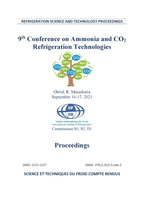
Recommended by the IIR / IIR document
Is chemical HFO refrigerants a solution for heat pumps?
Number: 0010
Author(s) : HOFFMANN K., GERRITSEN J.
Summary
Since 1920 many different synthetical refrigerant have been introduced onto the market. The latest so-called 4th generation synthetical refrigerant is the unsaturated HFC or HFO (Hydrofluoroolefins). They are introduced to combat an environmental issue, i.a. the global warming potential of HFC refrigerant, however, they are creating a new challenge. Recent research has shown that there is a build-up of fluoride substances as Trifluoroacetic acid (TFA) in drinking water globally. For some refrigerants the HFO 100% of the molecules break down into trifluoroacetic acid, which can lead to large health cost in the future, due to this environmental pollution. Whereas the refrigeration industry working with natural refrigerant are focusing on low charge and no leakages solutions, due to the flammability and toxicity of some of the natural refrigerant, there is very little effort by the industry working with synthetical refrigerant to create similar safe and low charge solutions. Although many of the same conclusion can be drawn from industrial refrigeration and heat pump systems, this paper focuses on the evaluation of HFO in industrial heat pumps, where it concludes that there is an environmental and cost benefit of using natural refrigerants.
Available documents
Format PDF
Pages: 12
Available
Public price
20 €
Member price*
Free
* Best rate depending on membership category (see the detailed benefits of individual and corporate memberships).
Details
- Original title: Is chemical HFO refrigerants a solution for heat pumps?
- Record ID : 30028947
- Languages: English
- Subject: HFCs alternatives
- Source: 9th IIR Conference on Ammonia and CO2 Refrigeration Technologies. Proceedings: Ohrid, North Macedonia, 16-17 September, 2021
- Publication date: 2021/09/16
- DOI: http://dx.doi.org/10.18462/iir.nh3-co2.2021.0010
Links
See other articles from the proceedings (31)
See the conference proceedings
Indexing
-
Themes:
HFO et HCFO;
Heat pumps techniques;
Industrial heat pumps - Keywords: HFO; R1234yf; Global warming; Toxicity; Heat pump; Health; Review; Industrial application
-
Industrial high temperature heat pump for steam...
- Author(s) : HAMACHER T.
- Date : 2023/05/15
- Languages : English
- Source: 14th IEA Heat Pump Conference 2023, Chicago, Illinois.
- Formats : PDF
View record
-
Screening of future-proof working fluids for in...
- Author(s) : PACHAI A. C., NORMANN J., ARPAGAUS C., HAFNER A.
- Date : 2021/09/16
- Languages : English
- Source: 9th IIR Conference on Ammonia and CO2 Refrigeration Technologies. Proceedings: Ohrid, North Macedonia, 16-17 September, 2021
- Formats : PDF
View record
-
Thermal dynamic analysis of low GWP alternative...
- Author(s) : YANG M., ZHANG H., QIN Y., NONG K.
- Date : 2023/04/05
- Languages : English
- Source: 3rd IIR conference on HFO Refrigerants and low GWP Blends. Shanghai, China.
- Formats : PDF
View record
-
Experimental investigation of R1336mzz(E) in a ...
- Author(s) : ARPAGAUS C., PARANJAPE S., BRENDEL L. P. M., SIMONI L. D., KONTOMARIS K., BERTSCH S. S.
- Date : 2022/07/10
- Languages : English
- Source: 2022 Purdue Conferences. 19th International Refrigeration and Air-Conditioning Conference at Purdue.
- Formats : PDF
View record
-
Is HFO the last generation of synthetical refri...
- Author(s) : HOFFMANN K., GERRITSEN J., HAFNER A.
- Date : 2021/08/31
- Languages : English
- Source: 13th IEA Heat Pump Conference 2021: Heat Pumps – Mission for the Green World. Conference proceedings [full papers]
- Formats : PDF
View record
